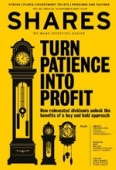Archived article
Please note that tax, investment, pension and ISA rules can change and the information and any views contained in this article may now be inaccurate.
How to save money when you’re investing

Whether it’s a buy one get one free offer in the supermarket or getting an early deal on a getaway, most people love bagging a bargain.
But it’s a bit more difficult when it comes to investing – shares don’t have three for two offers, and the only way to buy at a discount is if you do so when a stock is out of favour.
But savvy investors can still keep costs down through a few simple tricks:
REGULAR INVESTING
Setting up a regular investment account with your fund supermarket has a number of benefits. First and foremost is the fact that experts say drip-feeding is often the most effective way to invest your money. Putting a set monthly amount into your holdings each month means you are not tempted to try and time the market with a lump-sum investment, running the risk of it falling immediately after your have invested.
Instead, regular investors benefit from so-called pound-cost averaging whereby, over time, you get a better deal because you are buying fewer shares or units in a fund when they are expensive and more when they are cheaper.
Pat Connolly, chartered financial planner at Chase de Vere, says: ‘It’s incredibly difficult to call markets, so investors need to decide whether they are happy to take that risk and invest a lump sum, which can potentially generate higher returns, or reduce risk by investing through regular payments. It is often the best way for novice or cautious investors and should allow them to sleep easier at night.’
ECONOMIES OF SCALE
Regular investing has another major benefit too in that most platforms will allow you to trade at a lower cost if you have an investment plan set up.
With AJ Bell Youinvest, for example, the standard dealing fee is £9.95 each time you buy or sell shares, but this falls to just £1.50 for those using the regular investment service.
Hargreaves Lansdown charges £11.95 as a standard dealing fee but also charges £1.50 for regular investment.
The reason for the lower regular investment charge is that platforms group trades together, so that trades are cheaper to transact and they pass this saving on so that investors benefit from the economies of scale. Investment plans are easily set up online and allow you to set a monthly amount to be invested on a particular day each month.
AJ Bell estimates that regular investors can save more than £100 a year compared to those who trade each month but have not set up an investment plan.
FREQUENT TRADING
Many platforms will reduce the fee for trading if you buy and sell regularly. Investors who make ten or more share deals a month can see their fees half. That might sound that a lot of buying and selling but bear in mind that share dealing incorporates not just company shares but bonds, exchange-traded funds and investment trusts.
At Interactive Investor you pay £10 per trade but that falls to £6 if you have traded 10 times or more a month for the preceding three months.
As discussed, investors using the AJ Bell Youinvest platform typically pay £9.95 per trade but see this fee fall to £4.95 per trade if they make 10 or more deals in a month.
However, while a discount on trading sounds appealing, investors should not be tempted to buy and sell for the sake of it. Patrick Thomas, investment manager at Canaccord Genuity, warns: ‘Trading regularly is not necessarily helpful if there is not much of a strategy behind it. If you are buying the same fund every month and getting a discount for the privilege then that might be advantageous, but not if you are choosing a different one every week depending on what you’ve read or how you are feeling.’
He adds: ‘You shouldn’t choose a platform just on the basis of free trades, as it will likely end up costing you in the long-term. More important is what you are trying to achieve, what you are investing in and what the costs of that investment are.’
LARGE TRADES
In other instances, platforms may charge less based on how much you invest. They might, for example, cap their charges at a certain amount or they could be staircased so that those who invest more pay a lower percentage.
At AJ Bell Youinvest, for example, the typical platform fee is 0.25% a year but this is capped at £30 a year for an ISA and at £100 a year for a SIPP. The effect of this is to reduce the overall percentage that you are paying. For example, £100 as a percentage of a £50,000 portfolio is 0.2% and on a £100,000 portfolio is just 0.1%.
Foreign exchange fees are another area where charges may be tapered depending on the size of your order. Fees start at 1% for trades up to £10,000 with AJ Bell, falling to 0.25% for deals worth more than £30,000. (HB)
Important information:
These articles are provided by Shares magazine which is published by AJ Bell Media, a part of AJ Bell. Shares is not written by AJ Bell.
Shares is provided for your general information and use and is not a personal recommendation to invest. It is not intended to be relied upon by you in making or not making any investment decisions. The investments referred to in these articles will not be suitable for all investors. If in doubt please seek appropriate independent financial advice.
Investors acting on the information in these articles do so at their own risk and AJ Bell Media and its staff do not accept liability for losses suffered by investors as a result of their investment decisions.

 magazine
magazine










